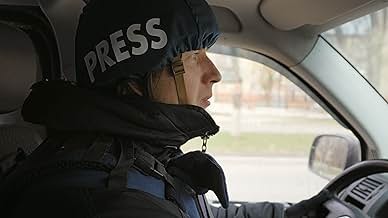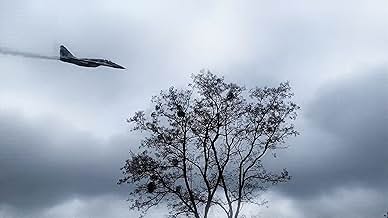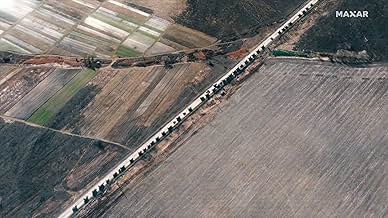An AP team of Ukrainian journalists trapped in the besieged city of Mariupol struggle to continue their work documenting atrocities of the Russian invasion.An AP team of Ukrainian journalists trapped in the besieged city of Mariupol struggle to continue their work documenting atrocities of the Russian invasion.An AP team of Ukrainian journalists trapped in the besieged city of Mariupol struggle to continue their work documenting atrocities of the Russian invasion.
- Won 1 Oscar
- 34 wins & 51 nominations total
Liudmyla Amelkina
- Self - Mariupol Resident
- (as Lyudmyla Amelkina)
Roman Golovanov
- Self - Correspondent
- (archive footage)
- …
Igor Konashenkov
- Self
- (archive footage)
Sergey Lavrov
- Self - Minister of Foreign Affairs of Russia
- (archive footage)
Ernest Matskyavichyus
- Self - Journalist
- (archive footage)
Vasiliy Nebenzya
- Self - Russian Ambassador to the UN
- (archive footage)
Volodymyr Nikulin
- Self - Police Officer
- (as Volodymyr)
Sergei Orlov
- Self - Deputy Mayor of Mariupol
- (archive footage)
Vladimir Putin
- Self - President of Russia
- (archive footage)
Linda Thomas-Greenfield
- Self - U.S. Ambassador to the UN
- (archive footage)
Volodymyr Zelenskyy
- Self - President of Ukraine
- (archive footage)
Featured reviews
10naq-1
This is a brilliant, moving, audacious documentary from an extremely talented videographer and team, and deserves at least an Emmy and, even more preferably, an Oscar, but awards are not enough for this exceptional work.
This is a rare, you-are-there experience, in which you are immersed in the Russian takeover of a city in the Ukraine, and where you feel every emotion that these poor beseighed people feel.
The documentary starts on the week of March in which the Russian oligarch Putin (not the President, which would mean that he was elected) announces to the people of Ukraine that he is about to invade the country, and within moments, actually does launch a full-scale invasion, and we watch it happen almost moment by moment. Bombs fall on Soviet-style apartment complexes at a rate of hundreds a day, and the entire landscape soon begins to resemble the aftermath of Hiroshima.
But what is most dynamic is the actual impact on the people themselves, many of whom do not know who is bombing them. Astounding. Watching children, pregnant moms, and hospital workers taking the worst beating of all is utterly depressing, but, like all medicine, needs to be taken and swallowed whole.
Overall, this documentary is one of the most heart-wrenching, devastating, tear-jerking experiences ever. You owe it to yourself to see this to get the full effect, since words can never describe how much of an impact it will have on you.
It is a shame that it would only be available on PBS, since that will alienate at least 95% of the population that needs to watch it, but if there is even a smidgen of justice left in the world, the few who see it will tell everyone they know, and hopefully, something will come from it.
Thanks to the brave filmmakers who told this shocking story.
This is a rare, you-are-there experience, in which you are immersed in the Russian takeover of a city in the Ukraine, and where you feel every emotion that these poor beseighed people feel.
The documentary starts on the week of March in which the Russian oligarch Putin (not the President, which would mean that he was elected) announces to the people of Ukraine that he is about to invade the country, and within moments, actually does launch a full-scale invasion, and we watch it happen almost moment by moment. Bombs fall on Soviet-style apartment complexes at a rate of hundreds a day, and the entire landscape soon begins to resemble the aftermath of Hiroshima.
But what is most dynamic is the actual impact on the people themselves, many of whom do not know who is bombing them. Astounding. Watching children, pregnant moms, and hospital workers taking the worst beating of all is utterly depressing, but, like all medicine, needs to be taken and swallowed whole.
Overall, this documentary is one of the most heart-wrenching, devastating, tear-jerking experiences ever. You owe it to yourself to see this to get the full effect, since words can never describe how much of an impact it will have on you.
It is a shame that it would only be available on PBS, since that will alienate at least 95% of the population that needs to watch it, but if there is even a smidgen of justice left in the world, the few who see it will tell everyone they know, and hopefully, something will come from it.
Thanks to the brave filmmakers who told this shocking story.
My family moved out of Mariupol in mid-2021. We lived in between the Drama Theater and maternity hospital, across from the University. We sometimes sat outside at Coffee Racer cafe next to the hospital, drank coffee, and watched people strolling along Miru Ave.
My mother stayed behind in Mariupol. Despite the ominous warnings, nobody really expected a full-scale invasion with bombs and artillery. She lived directly across the street from hospital #2, which is where the filmmakers hid through much of the movie. In fact, her burning apartment building is the opening shot of "Day 16". The area all along Kuprina St, adjacent to the hospital and small church, sits at the very western edge of the city, which took the brunt of the attacks approaching from Crimea direction.
After surviving the initial bombings and attacks, Mom had to drink, cook, and clean herself with water from a well adjacent to shallow graves of her neighbors. Survivors chopped up furniture to burn for cooking. It was truly medieval in every way possible, and intentionally so. After 73 days trapped, she made it out by a miracle of good luck, but not before first going through Bezimmene filtration camp.
None of my family will watch this movie except me. Everything is too close and too familiar. One thing the movie does not show is how vibrant and thriving this same city had been prior to 2/24/22. It seems surreal to see your old comfortable neighborhood get intentionally destroyed on international news. To be honest, the Russians were so jealous of Mariupol that they tried to murder it. They cannot get away with this.
This is a story that absolutely needs to be seen and heard - without any sugar-coating - as painful as it may be.
My mother stayed behind in Mariupol. Despite the ominous warnings, nobody really expected a full-scale invasion with bombs and artillery. She lived directly across the street from hospital #2, which is where the filmmakers hid through much of the movie. In fact, her burning apartment building is the opening shot of "Day 16". The area all along Kuprina St, adjacent to the hospital and small church, sits at the very western edge of the city, which took the brunt of the attacks approaching from Crimea direction.
After surviving the initial bombings and attacks, Mom had to drink, cook, and clean herself with water from a well adjacent to shallow graves of her neighbors. Survivors chopped up furniture to burn for cooking. It was truly medieval in every way possible, and intentionally so. After 73 days trapped, she made it out by a miracle of good luck, but not before first going through Bezimmene filtration camp.
None of my family will watch this movie except me. Everything is too close and too familiar. One thing the movie does not show is how vibrant and thriving this same city had been prior to 2/24/22. It seems surreal to see your old comfortable neighborhood get intentionally destroyed on international news. To be honest, the Russians were so jealous of Mariupol that they tried to murder it. They cannot get away with this.
This is a story that absolutely needs to be seen and heard - without any sugar-coating - as painful as it may be.
This documentary is about as real as it gets. The film is pieced together from footage shot in Mariupol during February and March 2022. You might have already seen snippets, especially from the maternity hospital, but this takes you day by day and includes some less common materials.
I won't get into the usual critiques of quality or story flow. That would be idiotic. They captured what they could in the midst of war, when everything including electricity for their cameras was at scarce. It surprises me that some reviewers are complaining, as if this were some Hollywood production in the making for five years. Jesus.
I recommend watching it. The war is ongoing, and it won't just disappear because we're tired of it. It serves as a powerful reminder to the world about what's happening in Ukraine every day.
I won't get into the usual critiques of quality or story flow. That would be idiotic. They captured what they could in the midst of war, when everything including electricity for their cameras was at scarce. It surprises me that some reviewers are complaining, as if this were some Hollywood production in the making for five years. Jesus.
I recommend watching it. The war is ongoing, and it won't just disappear because we're tired of it. It serves as a powerful reminder to the world about what's happening in Ukraine every day.
As heart wrenching a film as you're ever likely to see; you will be overwhelmed with disbelief that in the 21st Century the sights and sounds captured by Mstyslav Chernov's camera and microphone can actually take place; that innocent children, women and men can be forced to endure such torment and turmoil, by an aggressor who has no concern for the rules of engagement during times of conflict, and is clearly targeting the most vulnerable citizens of a city that's been battered and beaten continually by munitions of destruction, where even the hospitals are open season for razing. Not long ago it was Syria, For Sama, and there is a common denominator.
I was very lucky to attend a sold-out screening of 20 Days in Mariupol in Boston that Mstyslav Chernov himself attended. This is a must-see, brutally honest and beautifully told documentary that portrays the naked evil and barbarity of russia's full-scale invasion of Ukraine from a deeply human standpoint. Chernov's voice as a storyteller is achingly Ukrainian, and the film's tone and editing evoke a sort of spiritual pain that exceeds the material destruction of war.
20 Days has a very strong edit that leaves in moments of Chernov's camera falling by his side as he's resting or unable to film: these moments add extra depth of realism and transport the audience into the warzone, not just watching some polished news report. There is almost a "found footage" quality to the edit and frantic first-person shaky cam scenes, but this film is much scarier and more disturbing than any horror movie could be because it's the truth, and to this very moment Mariupol is occupied by the same ruzzian butchers seen in this documentary.
The music and sound are another highlight-- the film ends on images of russian occupation set to a disturbing, pulse-like tone. The music throughout by Jordan Dykstra compliments the scenes greatly and elevates the film's tone, both in highly disturbing war scenes and in moments of bleak, depressing stillness.
20 Days in Mariupol is a cultural and historical document that should absolutely be shown in schools, especially in the West, so non-Ukrainian people can finally begin to understand the brutal, colonial and genocidal nature of russian imperialism. Mstyslav Chernov is nothing short of a hero in my eyes, and an incredibly brave and profoundly-spoken human being.
Watch this film and show it to as many people as you can.
20 Days has a very strong edit that leaves in moments of Chernov's camera falling by his side as he's resting or unable to film: these moments add extra depth of realism and transport the audience into the warzone, not just watching some polished news report. There is almost a "found footage" quality to the edit and frantic first-person shaky cam scenes, but this film is much scarier and more disturbing than any horror movie could be because it's the truth, and to this very moment Mariupol is occupied by the same ruzzian butchers seen in this documentary.
The music and sound are another highlight-- the film ends on images of russian occupation set to a disturbing, pulse-like tone. The music throughout by Jordan Dykstra compliments the scenes greatly and elevates the film's tone, both in highly disturbing war scenes and in moments of bleak, depressing stillness.
20 Days in Mariupol is a cultural and historical document that should absolutely be shown in schools, especially in the West, so non-Ukrainian people can finally begin to understand the brutal, colonial and genocidal nature of russian imperialism. Mstyslav Chernov is nothing short of a hero in my eyes, and an incredibly brave and profoundly-spoken human being.
Watch this film and show it to as many people as you can.
Did you know
- TriviaA photograph by Evgeniy Maloletka of the injured pregnant woman being carried from the maternity hospital, was awarded "World Press Photo of the Year" in 2023. Her name was Irina Kalinina (32 years old). Her baby, named Miron (after the word for 'peace') was stillborn, and then his mother died in half an hour.
- Quotes
Self - Narrator and interviewer: When we were in the hospital, one of the doctors told me, "War is like an X-Ray. All human insides become visible. Good people become better, bad people worse".
- ConnectionsFeatured in 2024 EE BAFTA Film Awards (2024)
- How long is 20 Days in Mariupol?Powered by Alexa
Details
- Release date
- Countries of origin
- Official sites
- Languages
- Also known as
- 20 днів у Маріуполі
- Filming locations
- Production companies
- See more company credits at IMDbPro
Box office
- Gross worldwide
- $35,971
- Runtime
- 1h 37m(97 min)
- Color
- Sound mix
Contribute to this page
Suggest an edit or add missing content
























